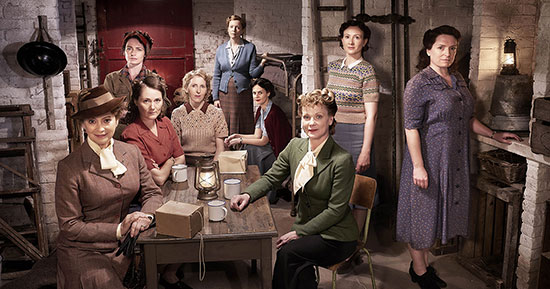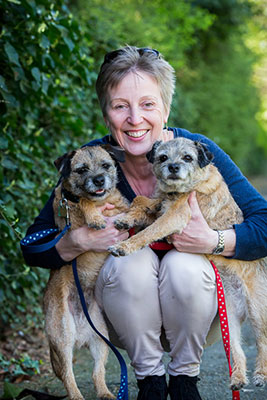Last Updated on May 5, 2017
Home Fires tells the story of a rural English town on the verge of World War II. As two powerful women struggle to put aside their differences in The Women’s Institute, a community learns to unite amidst the chaos and uncertainty of wartime. Samantha Bond (Downton Abbey) and Francesca Annis (Reckless, Cranford) star in this heartwarming story of courage, friendship, and holding onto light in our darkest moments.
The Final Season of Home Fires follows the village when conflict takes hold. As the separation from their husbands, fathers, sons and brothers becomes more painful, the women rely on one another and the friendships forged through village life. It will take calm, fortitude, and creativity to bring the diverse women of the village together, and to help the community survive what is to come.

In the first episode of this season: It’s June 1940, war is closer to home than ever, impacting the women of Great Paxford’s WI and their families. A Czech soldier stationed nearby becomes an unlikely friend, and tragedy strikes close to home. – PBS MASTERPIECE

Each week, Jambusters / Home Fires author Julie Summers will introduce us to the coming episode of Home Fires. Here she shares some historical context that will be helpful to have before you watch the period drama’s first episode of the second season, airing Sunday, April 2nd, 2017 at 9 on PBS MASTERPIECE.
No spoilers, she promises, just some background detail to add to the enjoyment of the series.
You can check back on Willow and Thatch for each installment, or sign up for the newsletter now.
If you haven’t already read about the characters and a wide historical background for this entire season, you can do that now here. When you are finished reading this, you may want to see the interview with Julie about Home Fires, and learn how her book was adapted into the television period series.
You can order Season 2 of Home Fires on DVD here.

Life on the Edge of Europe
Three weeks after the evacuation at Dunkirk, France fell to the Germans. Amongst the Allies who had been fighting were Polish and Czechoslovakian forces who were at risk of captured and put into German Prisoner of War camps. Churchill realised that if this could be avoided it would mean he would have experienced, battle-hardened troops in Britain. So he ordered them to be rescued from southern France. In the end some 20,000 Polish and nearly 5,000 Czechoslovakian soldiers and airmen were brought to Britain and proved themselves more than worthy of the trust Churchill had placed in them. The Czechoslovakians sailed into Liverpool and were put on a train to Bunbury from where they marched 8 miles to Cholmondeley Castle. The villagers along the way cheered them and the soldiers immediately fell in love with the beautiful Cheshire countryside. They camped in the fields around the Castle, which had already been requisitioned for another military use, and they remained there throughout the glorious summer of 1940 until they moved on to Leamington Spa to a more permanent camp.
The mood in the early summer of 1940 was one of agitation, anxiety and apprehension, mixed with fear. People were told that careless talk would cost lives and that they should be on the lookout for spies. Signposts were taken down or blacked out, so that moving around in the dark became even more difficult. There was a genuine and powerful fear of invasion. Even Churchill thought it unlikely that Britain could withstand a full-blown attack by the Luftwaffe and seaborne troops. The Battle for the Atlantic, which is the off-screen backdrop to our series, was about to enter troubled times. The German U-Boats had become ever more effective at targeting convoys and fears grew for the safety of passengers, especially evacuee children, who were setting out west for the safety of Canada or America. Yet once France had fallen there was a sense in Britain that, as the last man standing, on the edge of Europe, we would somehow defy the odds and emerge victorious. This mood is well-documented in diaries, letters and newspapers from the era.
So, for our village of Great Paxford, the sense of anxiety about the future is very much there. The incoming Czechoslovakian soldiers add a fresh element to the drama, as does the permeating anxiety about foreigners, spies and Nazi sympathisers. However, life did go on during the war and it will go on in Great Paxford.
The everyday lives of the characters are of course affected by the external influences but themes of love, loss, suspicion and excitement are constants. We pick up where we left off with Laura Campbell named in the divorce of her lover, Richard Bowers; Alison Scotlock is still in trouble with the police over accounting and Claire Hillman is as in love with Spencer as she was at the end of the last series. Bryn the butcher is typical of the kind of man who is determined not to be cowed by the threat of invasion. He has a business to run, a pregnant wife to protect and a missing son to worry about. Pat, on the other hand, is once again knocked down: not by husband Bob, this time, but by a brawl outside a pub. For her the war is about to change her life but in a wholly unexpected way. This episode opens with the farmer going about her business and the army going about theirs. After all, this is wartime… – Julie Summers

Each installment in this series of the history behind each upcoming episode will be on Willow and Thatch the Friday before the episode airs.
Watch each of the 6 episodes of the much-anticipated final season of this beloved series on Sundays, April 2nd – May 7th, 2017 at 9/8c on MASTERPIECE.
Need to catch up? Season 1 is available to stream for free with Amazon Prime. If you don’t already have Prime, you can get a free trial here.
The period drama Home Fires is created and written by Simon Block and inspired by Julie Summers’ book Home Fires which tells the true story of the WI on the home front from 1939-1945.

 About the book Home Fires: Away from the frontlines of World War II, in towns and villages across Great Britain, ordinary women were playing a vital role in their country’s war effort. As members of the Women’s Institute, an organization with a presence in a third of Britain’s villages, they ran canteens and knitted garments for troops, collected tons of rosehips and other herbs to replace medicines that couldn’t be imported, and advised the government on issues ranging from evacuee housing to children’s health to postwar reconstruction. But they are best known for making jam: from produce they grew on every available scrap of land, they produced twelve million pounds of jam and preserves to feed a hungry nation.
About the book Home Fires: Away from the frontlines of World War II, in towns and villages across Great Britain, ordinary women were playing a vital role in their country’s war effort. As members of the Women’s Institute, an organization with a presence in a third of Britain’s villages, they ran canteens and knitted garments for troops, collected tons of rosehips and other herbs to replace medicines that couldn’t be imported, and advised the government on issues ranging from evacuee housing to children’s health to postwar reconstruction. But they are best known for making jam: from produce they grew on every available scrap of land, they produced twelve million pounds of jam and preserves to feed a hungry nation.
Home Fires, Julie Summers’s fascinating social history of the Women’s Institute during the war (when its members included the future Queen Elizabeth II along with her mother and grandmother), provides the remarkable and inspiring true story behind the upcoming PBS Masterpiece series that will be sure to delight fans of Call the Midwife and Foyle’s War. Through archival material and interviews with current and former Women’s Institute members, Home Fires gives us an intimate look at life on the home front during World War II.
Julie Summers has written six books about the Second World War era including Stranger in the House: Women’s Stories of Men Returning from the Second World War, and When the Children Came Home: Stories of Wartime Evacuees.
Home Fires is available on DVD: The Masterpiece PBS mini-series follows a group of inspirational women in a rural Cheshire community with the shadow of World War II casting a dark cloud over their lives. The isolated village couldn’t feel further away from the impending bloodshed and battlefields and yet it is not immune from the effects of war. As the conflict takes hold, and separates the women from their husbands, fathers, sons and brothers, the characters find themselves under increasing and extraordinary pressures in a rapidly fragmenting world. By banding together as the Great Paxford Women’s Institute, they will help maintain the nation’s fabric in its darkest hour, and discover inner resources that will change their lives forever.
In the second season, Great Paxford’s eclectic band of women return for more stories from the home front as they deal with imminent threat during the Battle of Britain. As the nation finds itself increasingly beleaguered, relationships, friendships, and loyalties within the community will be tested as never before. The women find they must heighten their efforts to boost morale amidst the chaos and uncertainty enveloping the village.
You can order Season 2 of Home Fires on DVD here.


About Julie Summers: I was born near Liverpool and grew up first on the Wirral and then in Cheshire. Although the greater part of my childhood was spent outside pursuing any number of outdoor activities, I have always wanted to be a writer. For the first twenty years of life after university I worked in the art world but was drawn inexorably towards writing. Finally, in 2004, I gave up my job and began writing full time. It was the best decision I have made in my career. I am passionate about writing and unembarrassed to be so. I love researching my books, especially when they involve meeting people and talking to them about their lives.
People often ask me why I am so fascinated by the Second World War. My answer is that it is not war that interests me but the way people coped. In extreme situations such as war or mountaineering ordinary people find extraordinary strength and courage. That is what I enjoy learning about.
I have a little study in the attic of our house with one of the best views in Oxford – the dreaming spires seen from Iffley. I write in the mornings and find the problem is not sticking to the routine but tearing myself away from writing at the end of the day. My companions are two Border Terriers who keep me entertained and fit. They sleep in two old wine boxes under the window in my office.
I describe myself as a biographer and historian but the most important thing for me is to be a story teller.

If you enjoyed this post you’ll want to wander over to the Period Films List – the best costume and historical period dramas, romantic period movies, all sorted by era (like Victorian, Edwardian…) and theme (like family-friendly and Christmas Classics).



Judith White
April 3, 2017 at 5:27 am (8 years ago)Thank you for this information and for this article. Home Fires is a thrilling series for those of us on the other side of the pond as well as Great Britain. Thank you Julie Summers for bringing the village of Great Paxford to Life for us readers and thank you to the television programming people that provided the viewing on Masterpiece PBS.
Deborah Heley
April 2, 2017 at 1:43 pm (8 years ago)Loved the book “Jambusters.”
Geraldine Pointing
April 2, 2017 at 7:17 am (8 years ago)What a marvellous article! So much information and all we need to know before watching or even after having watched Series 1 and 2. Thank you so much!
Kathleen Hannon
March 31, 2017 at 8:44 pm (8 years ago)Thank you,Julie for writing the book that this fabulous show is based on I must order the book